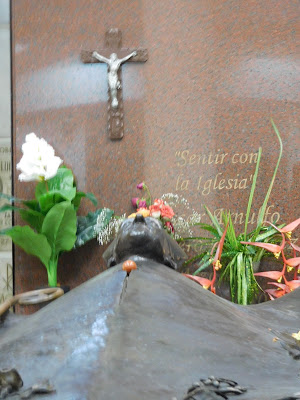I have been blessed to work with Father German for more than nine years. We’ve had our conflicts and I get frustrated with his long homilies (and I have been caught sleeping during at least one of them). But he has a unique perspective on the importance of the diaconate. He was for some years a Franciscan friar and was ordained a deacon, with the expectation that he would be ordained a priest shortly thereafter. But he remained a deacon for three years, despite requests from his Franciscan superiors. The diaconal ministry and the diakonia of the People of God are important for him.
We spoke of many things, and he shared his unique understanding of Saint Lawrence.
Lawrence was one of the seven deacons of Rome, with responsability for the goods of the church and for the care of the poor. Pope Sixtus and the other deacons were arrested and martyred by the Romans. Lawrence was spared since the Roman authorities thought the church had a storehouse of treasures and ordered him to hand over those treasures in three days.
Lawrence gathered the treasures of the church and sold them, even, according to reports, the sacred vessels of the church. He then distributed the money to the poor, the widows and orphans, the outcasts of society. When he appeared before the Roman authorities, he brought the poor, the outcasts, the lepers, the widows and orphans and told the Roman prefect, “These are the treasure of the Church!”
 |
| Woodcut of Ade Bethune |
 |
| Mural in the church of Dulce Nombre de María |
 |
| Stained glass in The Cloisters Museum |
Father German’s take on this was unique. Lawrence was saying that he was ready to be served as food, as nourishment.
Aren’t we called to be food for others, to offer ourselves as nourishment for others?
This is the diaconal call – of the diaconal People of God as well as the ordained deacon. We are to be the food, the nourishment – giving ourselves for God and the People of God (and, I would add, for the whole world).
I didn’t fully comprehend Father German's thoughts on Lawrence at the time. But last night, I was reading the reflection on Saint Lawrence by the German Benedictine Anselm Grün, in his book Cincuenta testigos de confianza.
The second image of Saint Lawrence which has always fascinated people is the image of the red-hot grill. Generally, the grill is an image of life: in its fire we are roasted to convert us into food for other people. This is represented in a graphic image: our life has to be penetrated by the fire of love. It could be said that only then will we be nourishment for other persons, only then will others to able to live from us and through us. (My translation)
La segunda imagen de San Lorenzo que siempre ha fascinado al pueblo es la de la parrilla incandescente. Por regla general, la parrilla es una imagen de la vida, en cuyo fuego somos asados para convertirnos en alimento de otras personas. Dicho con una imagen gráfica: nuestra vida tiene que ser penetrada por el fuego de amor. Se podría decir que sólo entonces seremos nutritivos para otras personas, que sólo entonces podrían otros vivir de nosotros y a través de nosotros. (p. 109)As ministers of the cup of the Blood of Christ, we deacons are called to pour ourselves out for God and for others, to shed our blood as Christ shed his Blood for us.
Few of us will be called to shed our blood in the style of Lawrence and other deacon martyrs, but each of us is called to put our hearts into our call for service, to sweat, to shed our blood and tears, to give ourselves for and with others.
We do this because our ministry flows from our baptism, our dying and rising in Christ. For us deacons, it especially flows from the altar and calls us to nourish the People of God, first of all, with our lives, the way we live in our families, in our jobs, in our social and civic duties. Then, bringing our lives, our needs and the needs and lives of all, especially the poor, to the altar, we ask God to transform our lives and the world by the fire of His love – to become a People who are living images of Christ the servant who came “to serve and not to be served, to give us life as a ransom for many.” (Matthew 20:28)
This is not easy. It means a daily dying. It means, recalling today’s Gospel (John 12: 24-26), being like the grain of wheat which has to die to bear fruit.
I close with these words from Saint Óscar Romero, martyred archbishop of San Salvador, to whom I dedicated my diaconate. Preaching on this Gospel text on April 1, 1979, he said:
To each one of us Christ is saying: If you want your life and mission to be fruitful like mine, do as I. Be converted into a seed that lets itself be buried. Let yourself be killed. Do not be afraid. Those who shun suffering will remain alone. No one is more alone than the selfish. But if you give your life out of love for others, as I give mine for all, you will reap a great harvest. You will have the deepest satisfactions. Do not fear death or threats; the Lord goes with you.
 |
| Romero's tomb in the cathedral crypt, San Salvador |





No comments:
Post a Comment